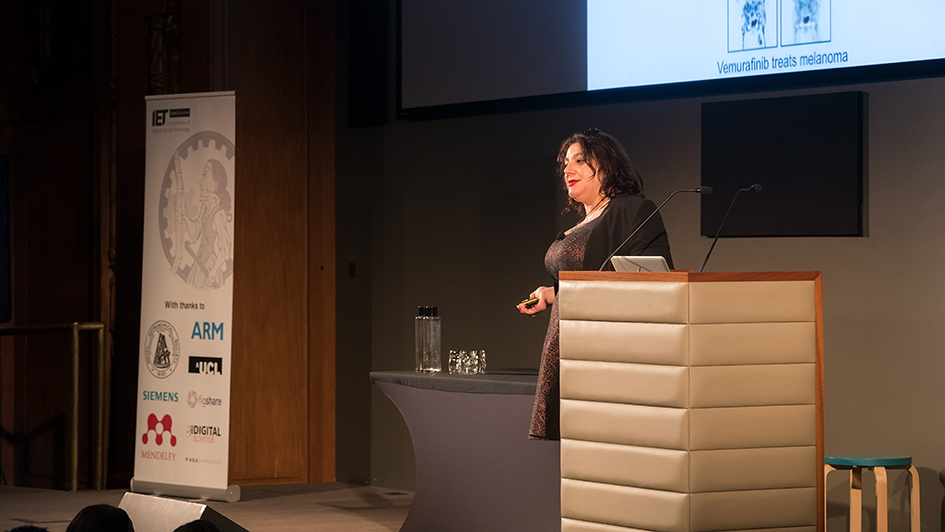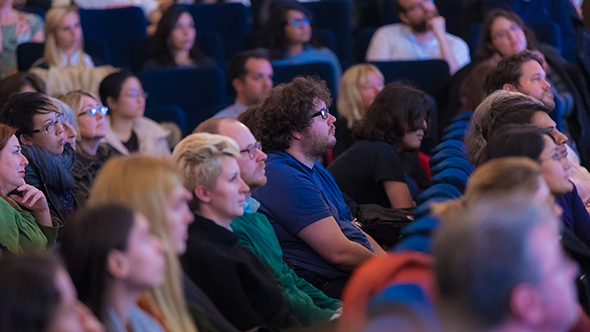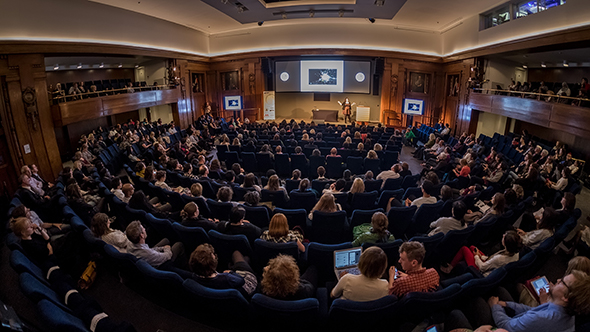
The ICR's Dr Bissan Al-Lazikani speaks at October's Ada Lovelace Live 2016 event (photo: Paul Clarke/CC-BY-2.0)
Dr Bissan Al-Lazikani believes that the future is closer than we think. I was recently lucky enough to watch the ICR scientist on stage at the Ada Lovelace Live 2016 event, an evening dedicated to celebrating women and science in technology.
Eight speakers came together to mark Ada Lovelace Day, which is held each year on the second Tuesday in October.
Countess Ada Lovelace was born in 1815. She had an interest in mathematics and the new ideas for calculating machines – many say that she wrote the first computer program.
The evening featured a range of speakers and performers, from the maths magician Dr Sara Santos to planetary physicist Dr Sheila Kanani, who showed us how to make a meteorite out of dry ice, coal and Worcester sauce.

The audience listens on during Dr Al-Lazikani's talk (photo: Paul Clarke/CC-BY-2.0)
The problem of evolution
Dr Al-Lazikani was invited to speak about her work in drug discovery, the thing that “gets her out of bed every morning.” She began by talking about the challenges of cancer research, especially focusing on the need for computer analysis and machine learning to comb through the reams of data and select the possible target proteins for cancer drugs to work on.
She went on to talk about the problems of cancer evolution – the fact that drug resistance can emerge in a cancerous population just as antibiotic resistance can emerge. It turns out that the proteins that cancer drugs target have networks, rather like a list of friends on Facebook – drug resistance arises as the cancer cell finds alternative routes through that network which avoid the proteins that the drugs have targeted.
But we can use network analysis to figure out how the drugs work in these networks, and so develop drug combinations that cut off all possible routes for the cancer cell’s survival.
The importance of mentors
The talk ended with a message of thanks and appreciation to Dr Al-Lazikani’s students, and their irreplaceable role in this science, and the cancer research of the future. Dr Al-Lazikani also spoke about the importance of mentors, such as Professor Paul Workman, and thanked her husband and child for their support too.

The event is held every year in October (photo: Paul Clarke/CC-BY-2.0)
The message on the importance of supporting each other, and team science, felt very appropriate and absolutely in the spirit of the evening. Ada Lovelace herself famously worked with Charles Babbage on her most famous writings.
At the end of the night, I was given a shard of thousand-year-old ice by Dr Anna Jones, who had been talking about her work as deputy science leader for the British Antarctic Survey's Atmosphere, Ice and Climate Team. I was struck by how lucky we were to be here, and to see so many inspiring and accomplished speakers who were at the top of their field.
The speaking opportunity was organised as part of a series of engagement activities for the ICR and The Royal Marsden’s Cancer Research UK Centre. If you are interested in being involved in public engagement at the ICR, please do get in touch.